Don't wanna be here? Send us removal request.
Text
no but guys actually. how do you have a full time job and also have hobbies
5K notes
·
View notes
Text
How to Write Strong Dialogue
(from a writer of ten years)
So you’re back in the writing trenches. You’re staring at your computer, or your phone, or your tablet, or your journal, and trying not to lose your mind. Because what comes after the first quotation mark? Nothing feels good.
Don’t worry, friend. I’m your friendly tumblr writing guide and I’m here to help you climb out of the pit of writing despair.
I’ve created a character specifically for this exercise. His name is Amos Alejandro III, but for now we’ll just call him Amos. He’s a thirty-something construction worker with a cat who hates him, and he’s just found out he has to go on a quest across the world to save his mother’s diner.
1.) Consider the Attitude and Characteristics of Your Character
One of the biggest struggles writers face when writing dialogue is keeping characters’ dialogue “in-character”.
You’re probably thinking, “but Sparrow, I’m the creator! None of the dialogue I write can be out of character because they’re my original characters!”
WRONG. (I’m hitting the very loud ‘incorrect’ buzzer in your head right now).
Yes, you created your characters. But you created them with specific characteristics and attitudes. For example, Amos lives alone, doesn’t enjoy talking too much, and isn’t a very scholarly person. So he’s probably not going to say something like “I suggest that we pursue the path of least resistance for this upcoming quest.” He’d most likely say, “I mean, I think the easiest route is pretty self-explanatory.”
Another example is a six-year-old girl saying, “Hi, Mr. Ice Cream Man, do you have chocolate sundaes?” instead of “Hewwo, Ice Cweam Man— Chocowate Sundaes?”
Please don’t put ‘w’s in the middle of your dialogue unless you have a very good and very specific reason. I will cry.
Yes, the girl is young, but she’s not going to talk like that. Most children know how to ask questions correctly, and the ‘w’ sound, while sometimes found in a young child’s speech, does not need to be written out. Children are human.
So, consider the attitude, characteristics, and age of your character when writing dialogue!
2.) Break Up Dialogue Length
If I’m reading a novel and I see an entire page of dialogue without any breaks, I’m sobbing. You’re not a 17th century author with endless punctuation. You’re in the 21st century and people don’t read in the same way they used to.
Break up your dialogue. Use long sentences. Use one word. Use commas, use paragraph breaks. Show a character throwing a chair out a window in between sentences.
For example:
“So, you’re telling me the only way to save my Ma’s diner is to travel across five different continents, find the only remaining secret receipt card, and bring it back before she goes out of business? She didn’t have any other copies? Do I have to leave my cat behind?”
vs.
Amos ran a hand over his face. “So, you’re telling me the only way to save my Ma’s diner is to travel across five different continents, find the only remaining secret recipe card, and bring it back before she goes out of business?”
He couldn’t believe his luck. That was sarcastic, of course. This was ironically horrible.
“She didn’t have any other copies?” He leaned forward over the table and frowned. “Do I have to leave my cat behind?”
The second version is easier to digest, and I got to add some fun description of thought and action into the scene! Readers get a taste of Amos’ character in the second scene, whereas in the first scene they only got what felt like a million words of dialogue.
3.) Don’t Overuse Dialogue Tags.
DON’T OVERUSE DIALOGUE TAGS. DON’T. DON’T DON’T DON’T.
If you don’t know what a dialogue tag is, it’s a word after a sentence of dialogue that attributes that dialogue to a specific character.
For example:
“Orange juice and chicken ramen are good,” he said.
‘Said’ functions as the dialogue tag in this sentence.
Dialogue tags are good. You don’t want to completely avoid them. (I used to pride myself on how I could write stories without any dialogue tags. Don’t do that.) Readers need to know who’s speaking. But overusing them, or overusing weird or unique tags, should be avoided.
Examples:
“I’m gonna have to close my diner,” Amos’ mother said.
“Why?” Amos growled. “It’s been in the family forever.���
“I’ve lost the secret recipe card, and I can’t keep the diner open without it!” she cried.
“The Bacon Burger Extreme recipe card?” Amos questioned.
“Yes!” Amos’ mother screamed.
“Well, that’s not good,” Amos complained.
vs.
“I’m gonna have to close my diner,” Amos’ mother said, taking her son’s hand and leading him over to one of the old, grease-stained tabletops with the ripped-fabric booths.
Amos simply stared at her as they moved. “Why? It’s been in the family forever.”
“I’ve—” she looked away for a moment, then took in a breath. “I’ve lost the secret recipe card. And I can’t keep the diner open without it.”
“The Bacon Burger Extreme recipe card?”
“Yes!” She still wouldn’t meet his eyes, and her shoulders were shaking. “Yes.”
Amos sat down heavily in the booth. “Well, that’s not good.”
The first scene only gives character names and dialogue tags. There are no actions and no descriptions. The second scene, however, gives these things. It gives the reader descriptions of the diner, the characters’ actions, and attitudes. Overusing dialogue tags gets boring fast, so add interest into your writing!
So! When you’re writing, consider the attitude of your character, vary dialogue length, and don’t overuse dialogue tags.
Now climb out of the pit of writing despair. Pick up your pen or computer. And write some good dialogue!
Best,
Sparrow
6K notes
·
View notes
Text
words to use instead of ________
"Mad"
aggravated, angry, annoyed, boiling, cross, enraged, exasperated, fuming, furious, heated, incensed, indignant, irate, irritable, livid, offended, outraged, riled, steamed, storming, upset
"Nice"
amiable, charming, cordial, courteous, delightful, favorable, friendly, genial, gentle, gracious, helpful, inviting, kind, lovely, obliging, peaceful, peachy, pleasant, polite, swell, sympathetic, tender, welcoming, well-mannered, winning
"Pretty"
alluring, appealing, attractive, beautiful, charming, cute, delightful, desirable, elegant, eye-catching, fair, fascinating, gorgeous, graceful, intriguing, lovely, pleasing, striking, stunning, sweet
"Said"
alleged, argued, asked, asserted, babbled, bellowed, bragged, commented, complained, cried, declined, demanded, denied, encouraged, expressed, giggled, growled, inquired, moaned, nagged, rebuked, rebutted, replied, rejected, retorted, roared, scolded, shrieked, shrugged, stated, taunted, vowed, warned, whined, whispered, yelled
"Went"
avoid, bolt, bound, depart, exit, escape, flee, fly, hike, hop, jaunt, jolt, journey, leap, leave, lurch, march, mosey, move, pace, parade, pass, progress, retreat, saunter, scoot, skip, split, step, stride, stroll, tour, travel, vanish
more words to use instead other words to use instead another list of words to use instead
12K notes
·
View notes
Text
Ideas to Show Secret Pining
"Why don't you join me?"
"I'll give you a ride, don't worry."
*does something they don't like* "What? I like it."
*immense staring at every chance they get*
*thinking of their crush while listening to songs*
"You said you liked it so I brought it for you."
*finds ways to spend more time with them*
*friendly bullying intensifies*
"I'm looking forward to seeing you there."
"Are you gonna be there?"
"How about we sneak off, just you and me?"
"Why don't I cook for them? What's their favourite dish again?"
*aggressive google searches about how to propose to your crush*
"I'll join those dance lessons, maybe then she'll notice me."
*hopeless around them*
*failed flirting attempts*
*increased compliments*
"My problem is that I like them a little too much for my sanity."
*gets jealous* "So, are you seeing them or something?"
"Are you okay?" // "Completely okay!" (definitely not okay)
*tries to sabotage their crush's date*
*gets into trouble so they can be scolded by their crush*
"I want you to come with me, please?"
-ashlee
9K notes
·
View notes
Text
practical writing advice
part 2
avoid writing in bed if you can. writing in bed is the mind-killer. writing in bed is the little death that brings obliteration. you may think "but i can write AND be cozy" you will get sleepy so fast. 98% of the time when i try to get a nighttime writing session done in bed i go to sleep. maybe 70% of the time if it's an afternoon writing session. also it fucking kills your wrists.
STRETCH before writing. stretch as many parts of your body as possible ESPECIALLY YOUR WRISTS! i have chronic tendonitis in both of my arms from not doing this and it is manageable but it is Not Fun!
plug your phone in on the other side of the room. better yet, plug it in and leave it in another room. better yet, power it off and leave it in another room. "i'll just check one quick thing" do not underestimate the power of the doomscroll.
do a warmup. look up writing prompts (i like one-word prompts or prompts that focus on a general theme as it's easier to integrate into my writing style), set a timer for fifteen minutes, or ten, or five, and go ham. make it shitty or incomprehensible, as long as you make it. create a dump document for all your warmups. i currently have two novels in the works that started as one of these fifteen minute little warmups.
pick your background noise ahead of time if you use it, and look for something long. i listen to 3-hour-long silent hill ambient mixes on youtube dot com.
take breaks. around every 45 minutes, as i'm noticing myself begin to lose focus, i get up, grab a drink, get my blood flowing, and give myself some space to breathe.
sometimes i sit down to write and i think "every atom in my body is averse to doing this right now. i would rather dance barefoot on a bed of nails than open my laptop and start typing." and you know what i do? i go do something else instead. don't force it! it will become a chore.
that being said! write as often as possible. try to write every day. try to write at the same time. don't beat yourself up if you can’t, BUT the more often you write, the more often you'll want to write.
if you're stuck on a scene or a page or a chapter, go back to the last place where you felt like you knew what you were doing and start writing from there. keep a copy of your other writing in case you want to reuse it or refer back!
i don't know if this is something that will be helpful for other people but i start mentally preparing myself for my writing session a few hours ahead of time. i will say to myself, "today, at this time, i'm gonna sit down and write that scene where mina walks out on her book club, and it's going to be awesome and i'm looking forward to it." then, by the time i actually begin, i basically have the whole thing written out in my head and can just put it down to paper. it's a good way to at least kickstart the session !
ok thanks bye
6K notes
·
View notes
Text
Master Dialogue Writing Techniques for Engaging Fiction (For Writers)
(Beware, long post!)
As fiction writers, we all know that effective dialogue is essential for bringing our stories and characters to life. After all, the way our protagonists, antagonists, and supporting players speak to one another is one of the primary ways readers get to know them on a deep, intimate level. Dialogue reveals personality, uncovers motivation, and propels the narrative forward in a way that felt narration simply can't match.
But nailing natural, compelling dialogue is easier said than done. It's a craft that takes serious skill to master, requiring writers to have a keen ear for authentic speech patterns, a nimble handle on subtext and implication, and the ability to strike that delicate balance between being true to real-world conversation while also keeping things snappy, dynamic, and laser-focused on the story at hand.
If you're someone who struggles with crafting dialogue that truly sings, never fear. In this in-depth guide, I'm going to dive deep into the techniques and best practices that will help you elevate your dialogue writing to new heights. By the end, you'll have a toolbox full of strategies to ensure that every exchange between your characters is as gripping, revealing, and unforgettable as possible.
The Fundamentals of Effective Dialogue
Before we get into the more advanced nuances of dialogue writing, let's start by covering some of the foundational principles that all great fictional conversations are built upon:
Reveal Character One of the primary functions of dialogue is to give readers a window into who your characters are as people. The way they speak — their word choices, their tone, their body language, their turns of phrase — should provide vivid insight into their personalities, backgrounds, values, quirks, and emotional states.
Think about how much you can glean about someone just from how they communicate in real life. Do they use a lot of slang and shorthand? Are they verbose and flowery with their language? Do they struggle to make eye contact or fail to respond directly to questions? All of these subtle linguistic cues are powerful tools for crafting multi-dimensional characters.
Drive the Plot Forward While revelations about character are crucial, you also want to ensure that your dialogue is constantly pushing the story itself forward. Each exchange should feel purposeful, moving the narrative along by introducing new information, triggering plot points, creating conflict, or prompting characters to make pivotal decisions.
Dialogue that feels aimless or extraneous will ultimately bore readers and detract from the forward momentum of your story. Every line should have a clear intent or function, whether it's uncovering a hidden truth, setting up a future complication, or escalating the tension in a high-stakes moment.
Establish Distinct Voices In a story featuring multiple characters, it's crucial that each person has a clearly defined and differentiated way of speaking. Readers should be able to tell who's talking just from the rhythm, diction, and personality of the dialogue, without any additional context clues.
This doesn't mean every character has to have an over-the-top, hyper-stylized way of communicating. In fact, the most effective character voices often feel grounded and natural. But there should still be distinct markers — whether it's word choice, sentence structure, tone, or speech patterns — that make each person's voice instantly recognizable.
Convey Subtext While the literal words being spoken are important, great dialogue also traffics heavily in subtext — the unspoken emotional undercurrents, power dynamics, and hidden agendas that simmer beneath the surface of a conversation.
The most compelling exchanges happen when characters are communicating on multiple levels simultaneously. Perhaps they're saying one thing out loud while their body language and tone convey a completely different sentiment. Or maybe they're engaged in a subtle war of wits, trading verbal jabs that reveal deeper wells of resentment, attraction, or vulnerability.
Mastering the art of subtext is key to creating dialogue that feels layered, lifelike, and imbued with dramatic tension.
Strategies for Writing Snappy, Realistic Dialogue
Now that we've covered the foundational principles, let's dive into some specific techniques and best practices that will take your dialogue writing to the next level:
Omit Unnecessary Details One of the biggest mistakes many writers make with dialogue is bogging it down with too much extraneous information. In real life, people rarely speak in perfectly composed, grammatically correct full sentences. We stumble over our words, interrupt each other, trail off mid-thought, and pack our speech with filler words like "um," "uh," and "you know."
While you don't want to go overboard with mimicking that messiness, you should aim to strip your dialogue of any overly formal or expository language. Stick to the essentials — the core thoughts, feelings, and information being exchanged — and let the subtext and character voices do the heavy lifting. Your readers will fill in the gaps and appreciate the authenticity.
Master the Art of Subtext As mentioned earlier, crafting dialogue that's rich in subtext is one of the keys to making it feel gripping and lifelike. Think about how much is often left unsaid in real-world conversations, with people dancing around sensitive topics, conveying hidden agendas, or engaging in subtle power struggles.
To layer that sense of unspoken tension into your own dialogue, consider techniques like:
• Having characters contradict themselves or say one thing while their body language says another
• Utilizing loaded pauses, interruptions, and moments of uncomfortable silence
• Injecting subtle sarcasm, skepticism, or implication into a character's word choices
• Allowing characters to talk past each other, missing the unspoken point of what the other person is really saying
The more you can imbue your dialogue with that layered, emotionally-charged subtext, the more it will resonate with readers on a deeper level.
Establish Distinct Voices As mentioned earlier, ensuring that each of your characters has a clearly defined and differentiated speaking voice is crucial for great dialogue. But how exactly do you go about accomplishing that?
One effective strategy is to give each person a unique set of verbal tics, idioms, or speech patterns. Maybe one character is prone to long-winded, flowery metaphors, while another speaks in clipped, efficiency-minded sentences. Perhaps your protagonist has a habit of ending statements with questioning upticks, while the sarcastic best friend always punctuates their barbs with an eye roll.
You can also play with differences in diction, syntax, and even accent/dialect to further distinguish how your characters communicate. The key is to really get to know the unique personality, background, and psychology of each person — then let those elements shine through in how they express themselves.
Lean Into Conflict and Confrontation When it comes to crafting gripping dialogue, conflict is your friend. The most compelling exchanges often arise from characters butting heads, engaging in verbal sparring matches, or working through deep-seated tensions and disagreements.
Conflict allows you to showcase the high stakes, unresolved needs, and deeper emotional currents that are driving your characters. It forces them to make bold choices, reveals aspects of their personalities that might not otherwise surface, and generates the kind of dramatic tension that will really hook your readers.
Of course, you'll want to avoid making every single dialogue scene a full-blown argument. But learning to sprinkle in well-placed moments of friction, confrontation, and clashing agendas is a surefire way to elevate the energy and impact of your character interactions.
Read Your Dialogue Out Loud One of the most valuable tricks for ensuring your dialogue sounds natural and lifelike is to read it aloud as you're writing. Hearing the words out loud will quickly expose any clunky phrasing, overly formal grammar, or inauthentic rhythms that would otherwise go unnoticed on the page.
Pay close attention to how the dialogue rolls off your tongue. Does it have a smooth, conversational flow? Or does it feel stilted and unnatural? Are your characters' unique voices shining through clearly? Are there any spots where the back-and-forth starts to drag or feel repetitive?
Actively listening to your dialogue — and making adjustments based on how it sounds in the real world — is an essential part of the writing process. It's one of the best ways to refine and polish those character interactions until they feel truly alive.
Hopefully, this can help you all!
The key is to always keep your focus on authenticity. Ask yourself: how would real people actually speak?
Hey fellow writers! I'm super excited to share that I've just launched a Tumblr community. I'm inviting all of you to join my community. All you have to do is fill out this Google form, and I'll personally send you an invitation to join the Write Right Society on Tumblr! Can't wait to see your posts!

882 notes
·
View notes
Text
The Mini Guide to Crafting Compelling Royal Characters for Fiction Writers
Creating royal characters can be both exciting and challenging. These regal figures often play pivotal roles in stories, capturing readers' imaginations with their power, privilege, and the weight of responsibility they carry. Whether you're writing historical fiction, fantasy, or contemporary novels featuring monarchs, this comprehensive (mini) guide will help you develop authentic, multi-dimensional royal characters that will resonate with your readers.
Understanding the Basics of Royalty
Before diving into character creation, it's essential to have a solid grasp of what royalty entails. Royalty typically refers to members of a ruling family, including kings, queens, princes, princesses, and other nobles within a monarchical system. These individuals are often born into their roles, though some may ascend to power through marriage or other means.
Key aspects to consider:
Hierarchy and succession
Royal duties and responsibilities
Protocol and etiquette
The concept of divine right (in some cultures)
The relationship between royalty and their subjects
Remember, while these elements are common in many royal systems, you have the creative freedom to adapt or reimagine them for your fictional world.
Developing Your Royal Character's Background
Every character, royal or not, needs a rich backstory. For royal characters, this background is particularly crucial as it shapes their worldview, values, and decision-making processes.
Consider the following:
a) Lineage: What is your character's family history? Are they from a long-standing dynasty or a newly established royal house?
b) Upbringing: How were they raised? Were they groomed for leadership from birth, or did they have a more sheltered upbringing?
c) Education: What kind of education did they receive? Was it formal, focusing on statecraft and diplomacy, or more well-rounded?
d) Relationships: How do they relate to their family members, courtiers, and subjects?
e) Personal experiences: What significant events have shaped their character and outlook on life?
Crafting a Unique Personality
Avoid the trap of creating one-dimensional royal stereotypes. Your character should be as complex and nuanced as any other well-developed protagonist or antagonist.
Consider these aspects:
a) Strengths and weaknesses: What are your character's admirable qualities? What flaws do they struggle with?
b) Motivations: What drives them? Is it a sense of duty, personal ambition, or something else entirely?
c) Internal conflicts: What personal struggles do they face? How do these conflicts affect their rule and relationships?
d) Hobbies and interests: What passions do they pursue outside of their royal duties?
e) Sense of humor: How do they express humor, if at all? Is it dry wit, sarcasm, or something else?
Balancing Power and Vulnerability
One of the most intriguing aspects of royal characters is the juxtaposition between their immense power and their human vulnerabilities. This balance can create compelling internal and external conflicts for your character.
Consider:
The weight of responsibility and its impact on their personal life
The isolation that often comes with a royal position
The constant scrutiny they face from the public and court
The struggle between personal desires and duty to the crown
Creating a Believable Royal World
Your royal character doesn't exist in a vacuum (I hope not). They're part of a larger royal ecosystem that includes family members, advisors, courtiers, and subjects. Developing this world adds depth and authenticity to your story.
Key elements to consider:
Court dynamics and politics
Relationships with other noble houses or kingdoms
The role of advisors and how they influence decisions
Traditions and customs specific to your royal setting
The economic and social structure of the kingdom
Addressing the Challenges of Royal Life
Royal characters face unique challenges that can drive your plot and character development. Some common themes include:
a) Succession disputes b) Balancing personal happiness with duty c) Navigating political alliances and conflicts d) Managing public opinion and maintaining legitimacy e) Dealing with threats to their rule or life
Use these challenges to create tension and drive your story forward while revealing more about your character's personality and values.
The Impact of Historical Context
If you're writing historical fiction or a fantasy inspired by real-world monarchies, it's crucial to consider the historical context. Research the time period and culture you're drawing from to ensure authenticity in your character's behavior, beliefs, and challenges.
Key areas to research:
Social norms and expectations of the time
Political systems and power structures
Technology and its impact on governance
Religious beliefs and their influence on royalty
Gender roles and how they affect royal duties and succession
Avoiding Common Pitfalls
When creating royal characters, be mindful of these common mistakes:
a) Making them too perfect or too villainous b) Ignoring the realities of royal life (e.g., lack of privacy, constant duties) c) Overlooking the impact of their decisions on their subjects d) Failing to show growth or change over the course of the story e) Relying too heavily on stereotypes or clichés
Incorporating Royal Etiquette and Protocol
Royal characters often adhere to strict codes of conduct and protocol. While you don't need to become an expert in royal etiquette, incorporating some of these elements can add authenticity to your story:
Forms of address (Your Majesty, Your Highness, etc.)
Court ceremonies and rituals
Dress codes and regalia
Rules of precedence in social situations
Diplomatic protocols when interacting with other royals or dignitaries
Exploring Different Types of Royal Characters
Remember that not all royal characters need to be ruling monarchs. Consider exploring other royal roles, such as:
The rebel prince or princess who rejects their royal duties
The reluctant heir thrust into power unexpectedly
The exiled royal fighting to reclaim their throne
The royal spouse adapting to life in the palace
The illegitimate child discovering their royal heritage
Each of these archetypes offers unique storytelling opportunities and challenges for character development.
Balancing Historical Accuracy and Creative License
If you're writing historical fiction featuring real royalty, you'll need to strike a balance between historical accuracy and creative interpretation. While it's important to respect known facts and timelines, you also have the freedom to explore the inner lives and motivations of these historical figures.
Tips for balancing accuracy and creativity:
Thoroughly research the historical figure and their time period
Clearly differentiate between historical fact and fictional interpretation
Use author's notes to explain any significant departures from known history
Focus on filling in the gaps in the historical record rather than contradicting established facts
Developing Royal Character Arcs
Like any well-rounded character, your royal protagonist should undergo growth and change throughout your story. Consider how their experiences might challenge their beliefs, alter their perspective, or force them to confront their flaws.
Possible character arcs for royal characters:
From naive idealist to pragmatic ruler
From reluctant heir to confident leader
From isolated monarch to connected leader who understands their subjects
From power-hungry tyrant to benevolent ruler (or vice versa)
Remember, character growth doesn't always have to be positive. Sometimes, the most compelling stories involve characters who face moral decline or tragic falls from grace.
Remember, while the trappings of royalty may be grand, at their core, your royal characters are still human. They love, fear, hope, and struggle like anyone else. It's this humanity, set against the backdrop of power and responsibility, that makes royal characters so fascinating to read and write about.
Happy writing, - Rin T
Hey fellow writers! I'm super excited to share that I've just launched a Tumblr community. I'm inviting all of you to join my community. All you have to do is fill out this Google form, and I'll personally send you an invitation to join the Write Right Society on Tumblr! Can't wait to see your posts!

2K notes
·
View notes
Text
some people think writers are so eloquent and good with words, but the reality is that we can sit there with our fingers on the keyboard going, “what’s the word for non-sunlight lighting? Like, fake lighting?” and for ten minutes, all our brain will supply is “unofficial”, and we know that’s not the right word, but it’s the only word we can come up with…until finally it’s like our face got smashed into a brick wall and we remember the word we want is “artificial”.
243K notes
·
View notes
Text
I have come up with a better metaphor than “you can’t pour from an empty cup” for burnout. You can’t boil an empty kettle. Pouring from an empty cup just gets you nowhere. Trying to boil an empty kettle can ruin the kettle, the stove, and burn down your house if you keep trying it.
132K notes
·
View notes
Text
My Top Five Polin Scenes in Part One (and why!)
My darling gossipers, so far this show is making literally all of my hopeless romantic dreams for this couple come true and who knows what kind of angst and drama were in for in part two, so before things gets too real I just wanted to go into (too much) depth on my favorite scenes and a few swoon-worthy details from part one! *whips reigns on carriage* shall we?
5. Drawing Room Lesson/Journal

Pen's brain: TOUCH ALERT! HIS HAND IS ON MY BACK.
This scene is so best friend coded with the way they are bantering and flirting the whole time. There's an adorable contrast between Penelope's fear of being discovered and Colin being like it's chill!(when in fact it is not Chill because they get interrupted after 5 minutes of gazing into each others eyes)
He just clearly wanted to be completely alone and behind closed doors platonically with his very beautiful friend (who looks like an angel in this scene) to pretend they are courting. Nothing suspicious about that!
I love how he's so into the lesson to the point that he has set out the lemonade as a prop and brought her to Bridgerton house in the first place specifically because she said it was where she was most comfortable (previously, but he's doing his best, and probably hoping she will become comfortable again, ouch)
Colin being the "dashing suitor" for her to flirt with (loser) and when she's resistant to fake flirting with him he hits her with the, "you don't have to be embarrassed, you know me!" trying to put her at ease. And he succeeds! Penelope is so comfortable during this scene when she's opening up about how it's hard for her to get her personality across, it's so sweet and honest.
And this is when the ROMANCING really starts, I love how it's Penelope who takes the lead here. mostly by accident, but the poor man is still left in shambles.

I do kind of wish for this scene they had gone with a more back and forth flirting moment, and seen them both get a little taste of how overtly flirting with each other would feel rather than her little poetic moment, but it was sweet to see her expose a corner of her feelings for him and watching him get a tad flustered at the compliment.
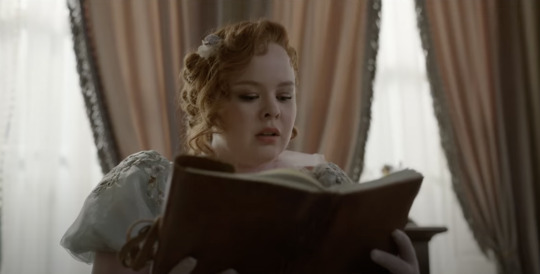
Ok, while it was rather uncool of her to read his journal, I love this part so much. Because I am no better, I would 100 percent do this given the chance. Her examining the space where he spends time, her running her hand over his pirate coat, (who wouldn't) the quiet yearning of that action. As a snoop myself, this was wish fulfillment.
Penelope being hit with a confusing mix of jealousy and intrigue by the contents of the journal entry, the way she stops reading for just a second and then gives in and devours his writing, not being able to hold back from getting inside his head. Don't think about how she probably missed his letters.
Colin's anger here is warranted, and I liked how he didn't come across as aggro-angry Colin from the books but is still justifiably upset that his privacy has been violated. He is likely aware that there are certain DETAILS he wouldn't want her to be reading, like how he's a lonely lonely sad little man trying to be rakish and roguish because his beautiful platonic friend isn't writing him back and encouraging him like she usually does.
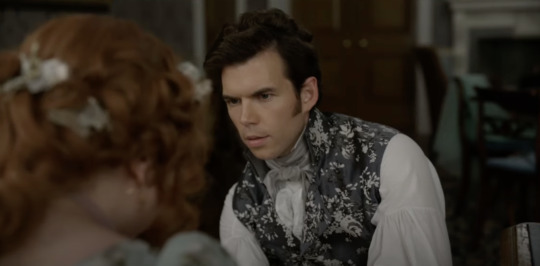
Can I just mention that bandaging a wound is an excellent trope and it's such a good romancing vehicle: the care, the tenderness, the touching! the GRUMPINESS! But my favorite thing about the wound bandaging is his reaction to her complimenting his work, of which he hasn't shown ANYONE. He's just so shocked that she likes it, and clearly starved for her encouragement/anyone to be interested in his travels.
I think its also worth noting that this is THE moment that Colin thinks back to when he's considering activating his chaos tendencies by rolling up to the red ball to interrupt her proposal, so I'm gonna interpret that as him recalling his first realization/admittance to himself that he has feelings for her beyond friendship.
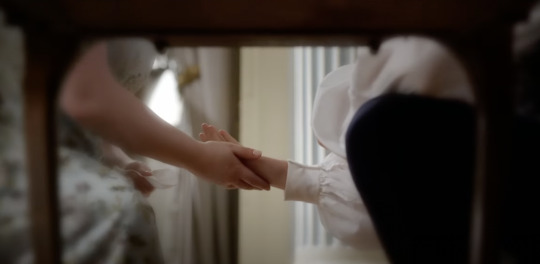
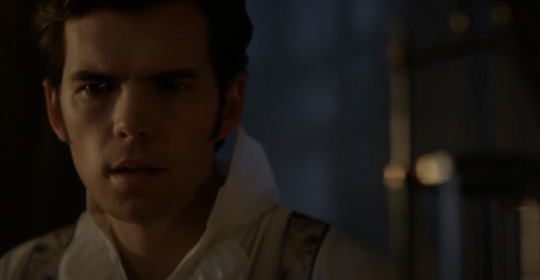
It wouldn't surprise me since it is after this moment that we see the hints of jealousy start to manifest at the full moon ball (looking for her, asking her if she likes a suitor, he's not subtle with it). Can't blame him, he was just touched with intimacy and care, and told his creative outlet is well-written, he is being ROMANCED to the max and he can't handle it.
We also have our first "please" as Pen asks to help, and as we will see, these two can't say no to each other once the magic word is spoken! I hope this theme makes a comeback in part two (please please please)
4. Market Scene
ok, besides a semi-silly looking wig on Colin (reshoots) this scene is first of all, so beautiful.
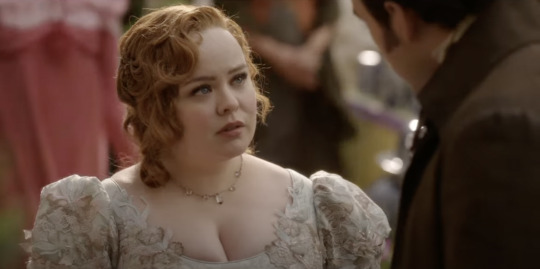
SHE IS SO FINE IN THIS SCENE I CAN'T EVEN THINK. She looks like a preraphaelite painting and I'm gnawing at the bars of my enclosure.
I literally kept saying "wow" out loud. It actually makes the scene very silly to me because she keeps talking about how she'll never snag a husband and I'm over here on one knee begging for a chance.
If Penelope has been Colin's cheerleader and #1 supporter for their whole friendship, this is where that flips. This scene is all about Pen feeling dejected about her prospects and Colin trying to lift her spirits -basically by saying she doesn't need to work on anything because he already likes her so much without her doing anything but I digress!
There is nothing hotter than your crush talking about a shared memory! Literally nothing! You can see her absolutely light up here when he talks about their first meeting like "I can't believe he remembered" and "Shit, I'm trying to not be in love" and it makes me ache for her.
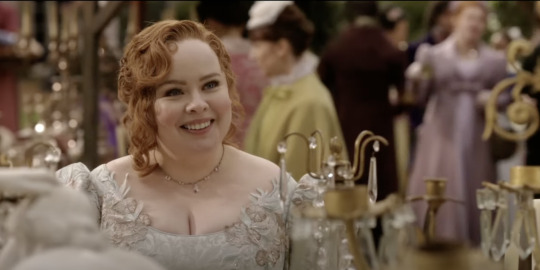
I am very sad we didn't get a meet cute flashback (hello romcom!!) but this was the next best thing. He's also definitely still in Rake Mode with the way he is being charming and flirty, but there is a core of genuine feeling here as he is trying to get her find her confidence and be more like the non-self conscious children they once were. I believe a lot of the rift between them was directly because she had such strong feelings for him and couldn't just connect with him as friends due to the pedestal she put him on, this scene shows that without that as a barrier, they are able to connect much more naturally.
"Living for the estimation of others is a trap, once you break free the world opens up," he says, and he's starting to realize this idea but hasn't quite put it into practice. I think seeing Penelope struggling to be something she's not, just like he is, shows him how it's not working for either of them. This I think kickstarts his self-reflection and eventual rejection of external pressures later on, leaving him open to pursue other passions.
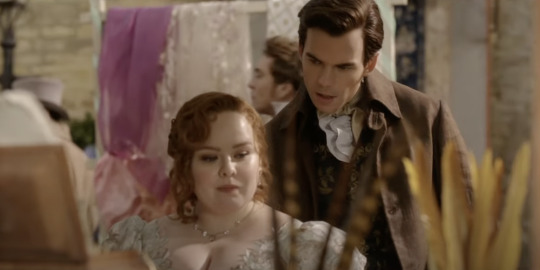
Ok but what I LOVE most in this scene is his subtle digging for information about her that she isn't forthcoming with. He asks her why she wants a husband and where she feels most comfortable, peppering her with questions and also giving her zero personal space. He's very curious about her and what is going on inside, but she's not exactly open with him at this point, giving short and simple answers.
She's genuinely not used to someone asking her this many questions about herself, receiving this kind of devoted attention, and she clearly doesn't know quite how to respond. In fact, the dynamic has always been reversed, where she was encouraging and inquiring about him, so this switch is just excellent. there have been little moments throughout the series where he asks about her and she always seems to deflect to talking more about him, so it's nice to see this shift.
Also fun detail, the grecian statues behind them are a little nod to the eros and psyche vibes of the scene as cupid is trying to find a match for his psyche, but is slowly beginning to fall for her, his curiosity the first step towards total downfall.

When he asks about Eloise is where Pen just completely shuts down and says she has to leave, and the "before we are noticed" with the little smile? I have fallen in love. She's clearly using that as an excuse to dodge the question, and it is almost an inside joke, sadly. As if she's saying "No one would believe you are courting me anyway haha". And yet he's clearly bummed she's leaving, he was having such a good time, and she leaves him hanging, wanting to know more. I also absolutely love the Rae side eye, lethal!
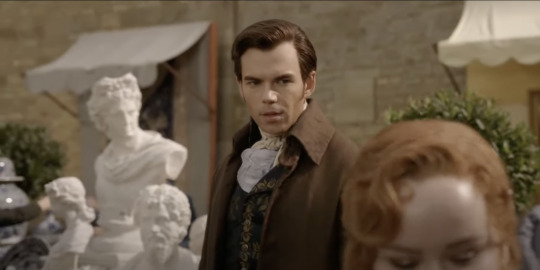
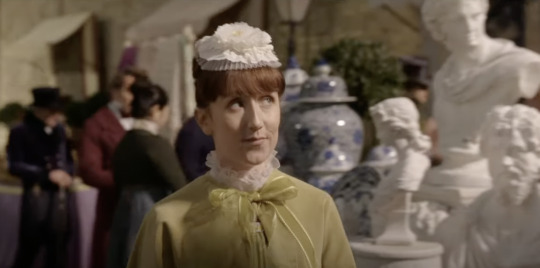
3. Candy Tent
Post-kiss insanity is on full display here. The way she beckons him with a sexy head tilt and he came running, the way his hands give away his nervousness and his eyes keep locking on her helplessly. Just FULL ON crush mode. The soft "How are you?" he missed her!
Also outfits are incredible here, the pearls in the hair, the painted vest, Colin inventing the color brown, it's a rococo dream. The plushy pink of the tent, the ambiance, everything is just in a word: sumptuous? never used that but it feels right here.

Pen's giddiness here is just adorable, she's experiencing blatant interest for the first time and I couldn't be happier for her. But someone else is very peeved, indeed. He's trying to play the part of supportive friend while also just kind of feeling a lot of "confounding feelings"
The way he is trying to be so casual and attempting to keep up his swagger, but his true feelings are showing through BAD kind of harkens back to how Pen would interact with Colin in s1 and 2, with barely contained affection and hope. The script has been FLIPPED and it feels so good!!
I literally squeal every time he asks her if she's formed an attachment to Debling, this is the shit I signed up for!! Her saying Debling is not "unpleasant to gaze upon" and watching Colin just completely glitch out with jealousy. He's like AND WHAT ABOUT ME! Must be frustrating to be the most eligible bachelor of the season, and yet your very beautiful crush friend is complementing another man on his looks. When your crush expresses interest in someone it can be truly insanity inducing, so I feel for him here.
Pen is oblivious completely, she doesn't think any of what she is saying is negatively affecting him, in fact she thinks this news will make him happy! His lessons worked, she didn't care about being perceived and it is having the desired affect! and yet, he's miserable. Mission accomplished unsuccessfully if you will.
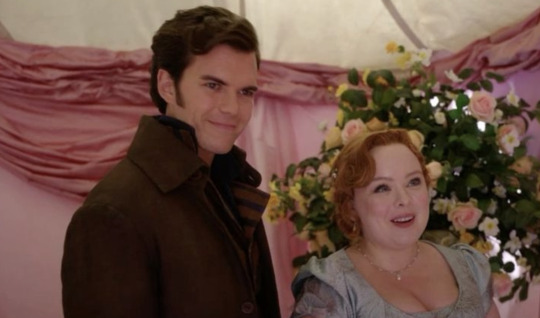
He does ALMOST a good job of hiding his feelings, but if Pen were not completely convinced he couldn't have feelings for her, I think she would've picked up on the vibes here. He's way less enthusiastic about the lessons, and is giving fairly curt responses, when before he was yapping on about being yourself and such.
Then of course the blatant staring at her mouth, being the yearning sort of man he is and likely recalling their kiss in detail, reminder it's been at least a week since. She's romancing him without even trying. It also makes sense for "food motivated" Colin to have Penelope + cake equals critical override of his facial expressions and his literally standing there slack-jawed with lust.
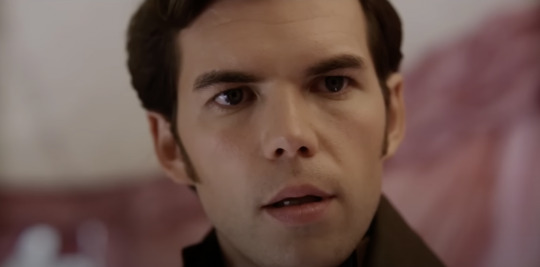
His soft "good luck", when she leaves and the fact that he doesn't mean it AT ALL.
I've seen it talked about, but it makes a lot of sense that Penelope wasn't as affected by the kiss as he was. I'm sure she enjoyed it, but for her the kiss was an end (more on that later) and for him it was the moment he admitted his feelings (which were already growing slowly). so it makes sense the yearning is very colin-sided in this scene.

Apart from the yearning, it's also just sweet to see them in cahoots and discussing this development with Debling like its a little group project, and its the perfect scene to show Down Bad Colin, and I love it. She also clearly wants him to share with her in her success, still wanting to be close to him in any way she can, which if I think about too much I'll cry.
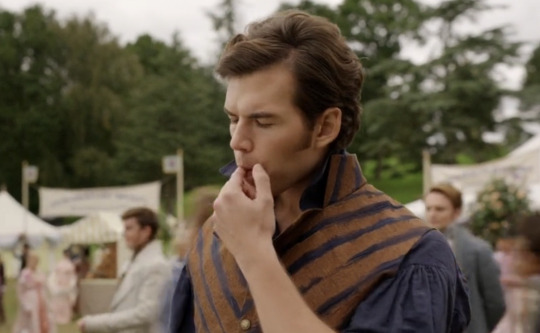
Bonus points for him eating the cake later on, such an intimate detail, he just wants to be close to her in any way he can. CRIMINAL! ARREST HIM!
2. First kiss/Dream Sequence
Ok I'm combining these scenes because they happen back to back and sort of like a mirror of each other, sue me. This first kiss scene is, as Whistledown says, RECKLESS. It's nonsensical, it's desperate, and it's beautiful.
This scene has only improved upon rewatches, it really has everything. Best kiss scene on Bridgerton and possibly in anything ever? no doubt no doubt?
The silly back and forth on the "You're not going to die" and the way she doesn't back down when he seems to get embarrassed, but instead says what? The Magic Word! "Please" she says, which of course is both of their activation word. His expressions here definitely mirror the book, where as soon as she asks him to kiss her, he's a bit taken aback by how much he realizes he wants to already.
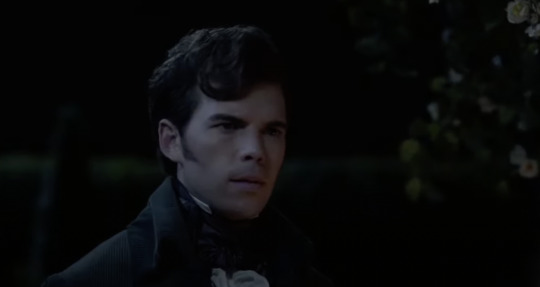
This is such a low moment for Penelope, and it's one parts embarrassing and two parts brave of her to ask him to kiss her. In her position, she doesn't even have her pride left, so why not ask the boy you love to kiss you? nothing will come of it anyway, and he probably won't even do it, so why not ask? And what are friends for!
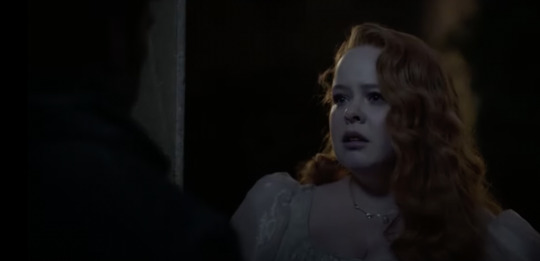
then the moment comes, and the music swells, as does the tension as he closes the distance between them, her shocked face and shallow breaths as she realizes its actually going to happen, the way he lifts her face to his with his hand under her chin. It's just pure romance. and this thing between them, this space that has never been crossed, is being crossed, and it feels insane. reckless. intimate!!

What I love is the shot that focuses on his face after they deepen the kiss, he's intent and confused by how good this feels, how little like kindness this is for him as soon as their lips touch. Like we will see later, he just kind of mind-blanks and forgets what is happening.
Whatever he thought they were has just crumbled with this kiss, and he leans his forehead against hers, no awkwardness when there is such tenderness. which is why he's so shook when she whispers "thank you", and rushes off. he's like "wait why is she thanking me? where am I? weren't we doing something here?" The hopeful strings as it focuses on his dumbstruck face, the earth literally shifting under his feet in that moment. UNREAL.
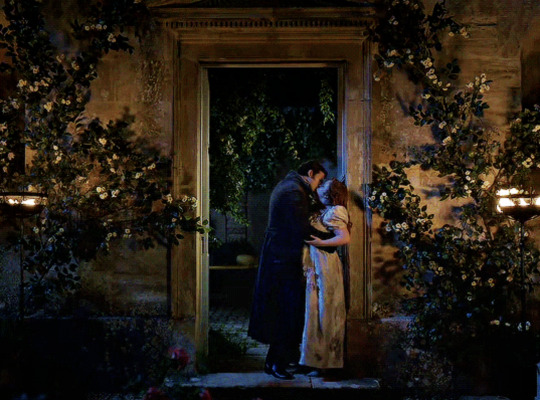
THE DREAM: I won't say a lot about the dream sequence but I just had to throw it in here because it shows how aligned they are romantically. They are both HUGE romantics, and he has orchestrated this sort of do-over kiss where he's really going for it and proving to her that he wants this too, he wants her. And she's enjoying herself, clearly, which we know is something Colin wants more than anything. It's a great way to show his inner feelings with the lack of an inner monologue that a book brings. And this is clearly a sort of parody of Bridgerton itself, or at least the books. It's over the top, a little silly, and exactly what we all want to see.
This dream also isn't just ripping off clothes, it's emotional, a key element is him expressing how he's been thinking about her, consumed by her. This kiss also isn't as innocent and patient as the first kiss, and it's full of Reciprocation, she can't stop thinking about him either. AND NEITHER CAN I!!!
Both of these kiss scenes also set up our contrasting feelings, where Pen views their first kiss as an end of a dream, a bittersweet act to finally let go off him, the dream of him. And then his dream shows the opposite, how she's ignited something in him that begins his dream of her, awake and asleep. Dream-swap! Also the hand on the wall behind her to catch her from hitting the wall. no comment.
1. Carriage Scene
Yeah like what can I say! It's incredible! I honestly have no idea how they can top this scene, but honestly if this is the best love scene they share in the season I am 10000% content. All of my little qualms with how they did the season melt away when I watch this scene because this was what was crucial to nail and they NAILED IT. TO THE WALL BABY. YAY.
And how did he gain access to the carriage (and Penelope)?? by saying please!! we love the magic word!! I do like the confession a lot, especially the "what if I did have feelings for you?" and the way he gets to his KNEES, a truly inspired moment.
How he completely dies inside when she says they are friends, and still accepts it with grace. There were SO many obstacles to him expressing his feelings to her this night, and he just red rovered each one, and we are all very grateful.

Something about this scene is just built different, I like a lot of the love scenes in the show, but this one has some kind of secret ingredient that we didn't know we'd been missing. Maybe its the location, the context, the way they are just grasping at each other desperately (which if you think about how Penelope thought this was a one time thing in the books and she wanted to make the most of it, actually don't think about that)
He's also just so sweet about it, he's not angry, or insistent, he's just honest and intent. and she's just bewildered and INTO IT.
The lightning is gorgeous, the way it looks like Penelope is catching on fire and glowing. the catharsis, the giving into passion. The way she smiles like her dreams are coming true (because they are) before he just completely attacks her. What else can I say but EEEEEEEEEEEEEEEEEEEEE!!!
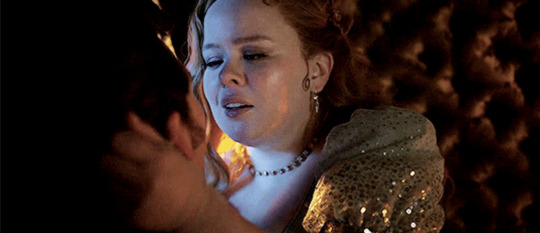
so many of the kisses are so tender and gentle, and they just build and build and build in intensity as they get lost in each other.
on a more horny note, so many moments here actually make me physically roll my eyes back in my head with how insane they make me. The desperate boob grab, the consensual nod, the way his hand slips under her dress, they were truly so insane for this. something tells me they knew I've waited literal years for this, so they knew they had to make it good.
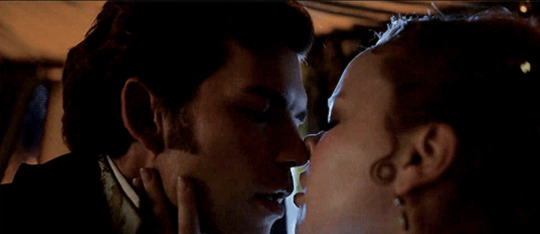
Someone said Nicola should get an Emmy nom for moans, and she should, somehow they don't come across as cartoonish at all, and it doesn't take me out of the scene like some "noise making" does in these types of scenes. and for the record I'm not jealous at all, of either of them. in fact, no sooner did my head hit the pillow that I was met with complete and total darkness....not even a dream....
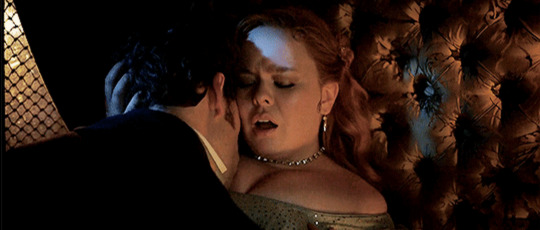
Like everything I could say has already been said, but it was so much better than I thought it was going to be, blew my expectations out of the water and DELIVERED. and DEVOURED. and RUINED ME. AND I AM VERY GRATEFUL.
Anyway that's all, I'm very afraid for part two so I needed some escapism, why am I already nostalgic for the good ol' times when Polin was happy for 6 minutes. thanks for reading! <3
537 notes
·
View notes
Text
I'm neurodivergent as well as disabled and "10 minute blocking" has changed my life.
I find completing tasks really challenging because I either get super overwhelmed, distracted, or my pain/fatigue levels rise too much and I get defeated.
So I recently introduced the 10 Minute Block rule. It's super simple. I simply pick one thing I need to do, set a timer usually for 10 mins (+/- 5 mins depending on fatigue/pain levels) and then go go go! And I try and do as much of that one thing as I can within the time limit. The rule is that I have to stop after 10 minutes.
If I feel spurred on after the 10 mins is up, then I'm free to start another 10 minute block (either to carry on with the same task or start a new one) and do this repeatedly for as long as I wish, but I absolutely must stop after each block and assess how my body is doing and finish blocking when my body tells me to.
If I am feeling defeated or tired or whatever after 10 mins, even if the task isn't finished, I stop. I rest, congratulate myself on doing those 10 minutes, and then find something fun/restorative to do instead without feeling guilty.
It's really improved my perception of productivity as well as taught me how to pace my body better.
I don't know if this will be helpful to any of you, but it's something that I wish I'd known about sooner and has helped me so I thought I'd share it.
31K notes
·
View notes
Text
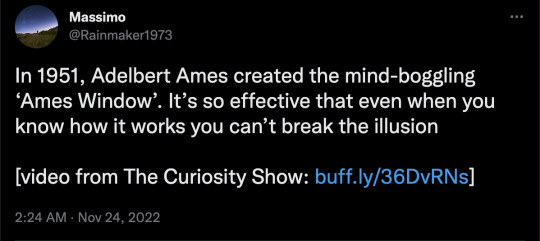
An interesting demonstration of how the human brain works.
But also something of a lesson regarding perception, and the unreliability of subjective perspective versus objective reality.
You can be extremely certain about how you perceive the world, your "lived experience," that which you "feel it in my heart." But that doesn't mean it's actually true. And it doesn't mean we have to endorse it, or ignore or outright deny objective reality.
That's a "you" thing, not a "we" thing.
81K notes
·
View notes
Text
Screaming this desperately into the void but-
You do not have to be in a working relationship with a deity in order to interact with them
I know this can seem like it's either common sense, or batshit crazy, so let me explain. I've seen a lot of witches generally saying that they don't interact with Deities they don't worship/work with. And this is absolutely fine.
You 100% DO NOT have to interact with deities that you don't want to. This is just a reminder for people who would like to interact with other deities/ don't worship a specific deity but still enjoy deity work.
I thank Hypnos every morning for a good night's sleep, and if i had trouble, i ask him to guard my dreams come the next night.
When one of my favorite songs comes on my playlist i send a smile up to Apollo (even if it was just by chance)
When i have a good time with my friends, i find myself thankful to Eros for all the love i have in my heart for my friends
These are just some examples and there are many other ways of interacting with deities but this is my PSA that you shouldn't be shy about it. i promise even if you dont have time to come up with a full formal prayer, the deity you interacted with WILL appreciate that you took time to think of them <3
184 notes
·
View notes
Text
43K notes
·
View notes
Text
26K notes
·
View notes

